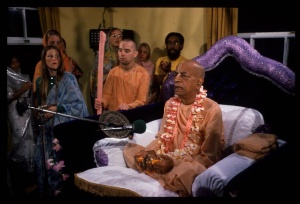CC Adi 11.37 (1975)

A.C. Bhaktivedanta Swami Prabhupada
TEXT 37
- kālā-kṛṣṇadāsa baḍa vaiṣṇava-pradhāna
- nityānanda-candra vinu nahi jāne āna
SYNONYMS
kālā-kṛṣṇadāsa—of the name Kālā Kṛṣṇadāsa; baḍa—great; vaiṣṇava-pradhāna—first-class Vaiṣṇava; nityānanda-candra—Lord Nityānanda; vinu—except; nāhi jāne—he did not know; āna—of anything else.
TRANSLATION
The twenty-second devotee of Lord Nityānanda Prabhu was Kālā Kṛṣṇadāsa, who was the ninth cowherd boy. He was a first-class Vaiṣṇava and did not know anything beyond Nityānanda Prabhu.
PURPORT
In the Gaura-gaṇoddeśa-dīpikā, verse 132), it is said that Kālā Kṛṣṇadāsa, who was also known as Kāliyā Kṛṣṇadāsa, was formerly a gopa (cowherd boy) of the name Lavaṅga. He was one of the twelve cowherd boys. Kāliyā Kṛṣṇadāsa had his headquarters in a village named Ākāihāṭa, which is situated in the district of Burdwan within the jurisdiction of the post office and police station of Katwa. It is situated on the road to Navadvīpa. To reach Akāihāṭa, one has to go from the Vyāṇḍela junction station to the Katwa railway station and then go about two miles, or one has to get off at the Dāṅihāṭa station and from there go one mile. The village of Akāihāṭa is very small. In the month of Caitra, on the day of Vāruṇī, there is a festival commemorating the disappearance day of Kālā Kṛṣṇadāsa.